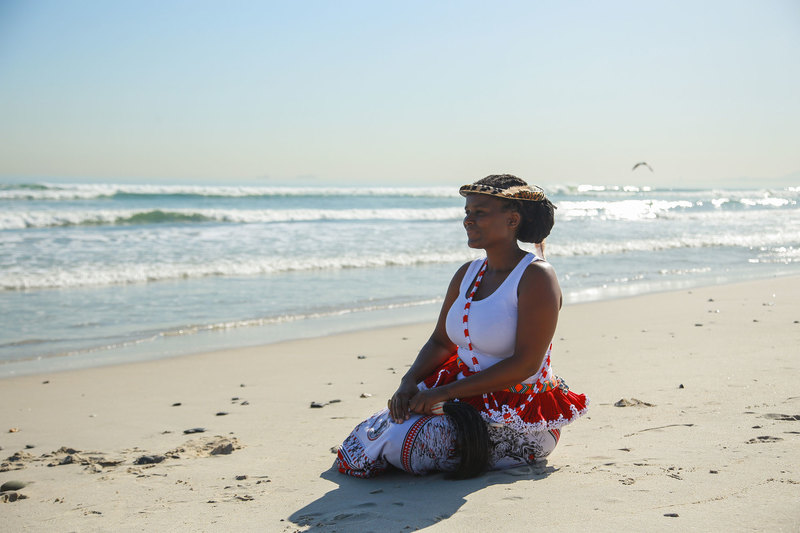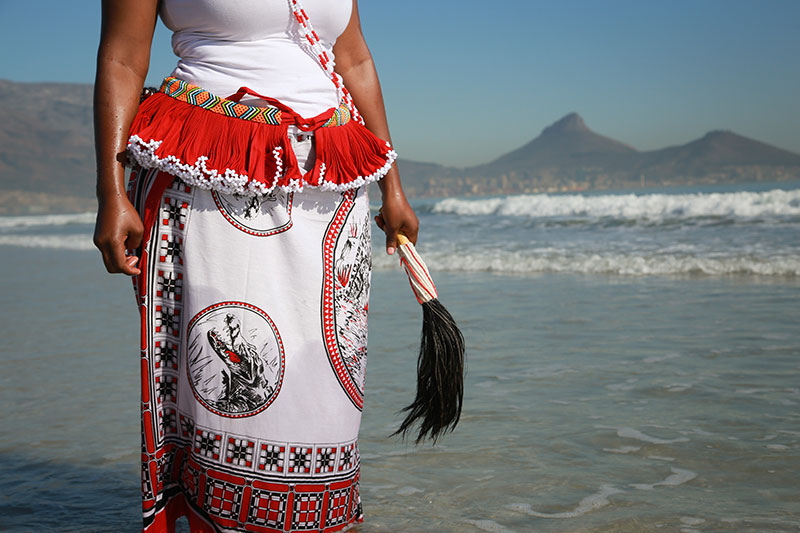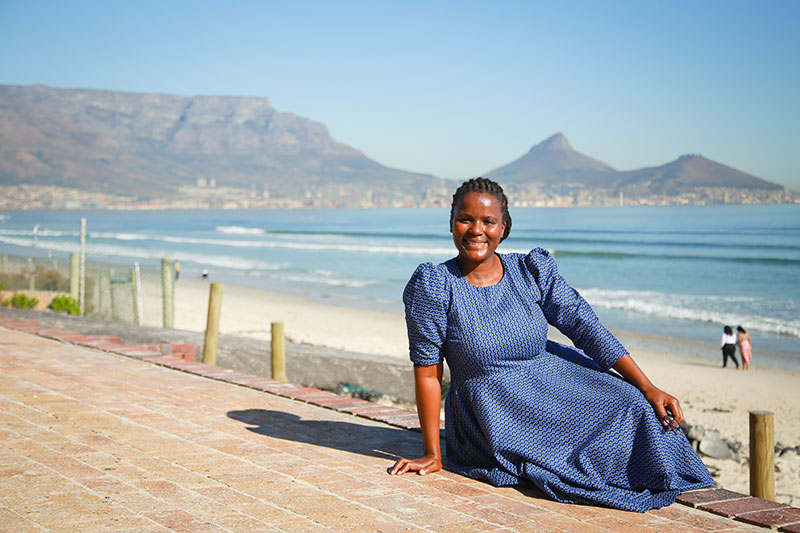World Oceans Day: Sustaining the ocean as a scientist and sangoma
08 June 2022 | Story Helen Swingler. Photos Je’nine May. Voice Cwenga Koyana Read time 9 min.
Dr Moagabo Ragoasha had never heard of oceanography before she came to the University of Cape Town (UCT). The Limpopo matriculant had been set to study astrophysics. But a small error on her registration form changed the course of her life. Now a PhD in oceanography, the scientist talked about the significance of her work and its links to her second calling – a traditional diviner-healer, or sangoma.
It had been a simple slip. Instead of astrophysics, she found herself registered for atmospheric sciences. Among the suite of allied subjects, she spotted oceanography. Here was something completely new. And she was curious. The brief description of the course took her back to her school days and Sunday afternoons immersed in BBC nature programmes on South African Broadcasting Corporation (SABC) TV.
By her honours year, her choice was made – and one she could rationalise.
“The wonderful thing about oceanography is that it allows you to study the atmosphere and the oceans,” Dr Ragoasha said.

She was to cross the oceans several times in the next few years. The Department of Oceanography has strong links to the University of Western Brittany, in France, which offered staff and student exchanges.
Ragoasha was chuffed when she was chosen to do part of her honours in France. And even more so when she was chosen for the IRD (French National Research Institute for Sustainable Development) ARTS (Allocations de recherche pour une thèse au Sud) PhD programme. This allowed her to spend half of each year at UCT and half in France, supervised by Professor Steven Herbette. Also, it was a feather in her cap that she was selected from a highly competitive pool of young researchers from the Global South.
Understanding ocean currents
She defended her PhD in May 2020, virtually during hard lockdown. Her doctoral research focused on regional ocean modelling, the southern Benguela current upwelling system, Lagrangian transport modelling, and coastal ocean dynamics.
Those dynamics include the Benguela Jet system, a north-westward flowing current in the southern Benguela region. It has an important influence on fish recruitment and carries anchovy eggs and larvae from the rich spawning grounds of the Agulhas Bank in the south, up the west coast of South Africa. It’s a bit like a conveyor belt, she explained.
“I use the physics and dynamics of the currents to simulate the ocean off this coastline to give us a more realistic view of how the oceans are moving and what drives the currents.”
“I use the physics and dynamics of the currents to simulate the ocean off this coastline to give us a more realistic view of how the oceans are moving and what drives the currents.”
Ragoasha uses a numerical computational method to predict the physical properties and currents of the ocean off this coastline, based on our knowledge of ocean atmosphere dynamics.
“In addition to observational data, we get a better view of how the oceans move and drives the current,” she said.
There are implications for climate systems too – and the economic viability of these fisheries.
“This year we experienced a low [spawn] biomass in the current, with the fewer eggs and larvae arriving along the west coast. I’m interested in the viability of that and being able to deduce how the system will respond.”
The number of anchovies that reach adulthood varies from year to year, and fisheries are highly impacted by the number of anchovies reaching the west coast to grow and then return south to release their eggs.
“So, we use ocean models to predict favourable conditions for their successful transport to the west coast.”
Making space in academia
Now a lecturer in the oceanography department, Ragoasha teaches second-year students, having gained some lecturing experience at Rhodes University earlier in her career.
Black women oceanographers are a rarity in South Africa.
At UCT, Ragoasha came up through the New Generation Academic Practitioner (nGAP) programme, designed to address inequities like this. The programme grooms and mentors promising young black academics and creates spaces for them in the competitive academic system. Her mentor is Dr Katye Altieri. Ragoasha is now in Phase 7 of the programme and became a lecturer in October 2021.
The nGAP programme provides “a whole lot of support and guidance to PhD candidates”, from foundational support to guidance and mentoring, invaluable to young lecturers. The emphasis is on appointing mentors who understand the specific challenges black postgraduates face and can guide them appropriately.
There’s pressure on senior black students to move on and become family breadwinners. And the young scholars’ absolute reliance on their funding, for example, creates huge anxiety. Delays in accessing grant or research money can have massive repercussions for mental health and academic performance.
Another calling
Those close to Ragoasha say she was always meant to study the ocean.
In 2020, the same year she defended her PhD, she was called to continue a family cultural and spiritual responsibility as a traditional healer. This calling is passed on through the ancestral lineage to keep these traditions alive.
Her family remembered that her great grandfather had been a sangoma. Accepting this calling, Ragoasha began training as an apprentice.
“I would dream things and they would happen.”
She first became aware of her calling through revelations in dreams, one of the signs she had been chosen.
“I would dream things and they would happen,” Ragoasha explained.

She also discovered a significant link between her scientific work and her traditional healing work. Water spirits call the sangoma to the water, physically or in dreams, giving knowledge and gifts of healing.
To manage the twin responsibilities of her training and work as a lecturer, Ragoasha approached the head of the department, Professor Isabelle Ansorge. Although the first part of her sangoma training would be in Cape Town, she would have to travel to Mpumalanga for the second part. This would involve learning divination, how to use traditional healing herbs, dream interpretation, cleansing with iyeza, the art of beadwork, and spiritual diagnosis. She would also need to wear her traditional sangoma clothing on campus for a time after graduating.
With the department’s full support, she began what at times was a bewildering journey, she said.
It was often difficult to reconcile the duality of her experiences while training: the unexplained, mysterious aspects of ancestral communication and divination and her rigorous training as a hard scientist.
“It was mind blowing at times,” she said.
But she sees these as complementary wisdoms. In her scientific world she studies the oceans’ energy, bound up in the movement of currents around the globe. And as a traditional healer, Ragoasha recognises the deep spirituality and energy embodied in the oceans, the oneness, natural systems and the need to preserve this balance.
“When we gather the traditional healing herbs, roots and barks, these are collected in ways that don’t destroy the natural systems but preserve them for future generations.”

With that spiritual connection to the ocean and Earth’s water systems, comes a responsibility to keep water bodies healthy and alive.
“That’s because of the energy we get from natural resources: the sea, the rivers, mountains and caves and forests. And because that’s where our ancestors were.”
Ocean literacy
What is her message for World Oceans Day on 8 June?
“Ocean literacy,” she said.
Public engagement is vital to understanding the complex web of life that is dependent on the oceans. And teachers must be taught how to teach ocean literacy at schools across the country.
“The ocean has no barriers.”
“We must teach people why oceans are important, even if they live inland, far from the sea. We must explain the connections to climate, drought, and rain and how that affects them – wherever they are.”
Ocean literacy also helps the public understand why scientists raise the roof when a multinational oil company announces plans to conduct seismic testing along the seabed off the country’s southern coastline.
“It’s important they know the implications of the damage of seismic testing can do. And it can’t be contained to the area surveyed. The ocean has no barriers.”
 This work is licensed under a Creative Commons Attribution-NoDerivatives 4.0 International License.
This work is licensed under a Creative Commons Attribution-NoDerivatives 4.0 International License.
Please view the republishing articles page for more information.
Highlights from 2022
As we look back on 2022, we celebrate some of the stories that were popular with readers of the UCT News website during the year.

The Hasso Plattner d-school Afrika at UCT hosted the prestigious d.confestival, the first design thinking event of its kind in Africa.
13 Jan 2023 - 4 min read Readers’ Choice 2022
UCT researchers were honoured for their research at the NRF awards, while others were added to the NRF’s list of A-rated scholars.
12 Jan 2023 - 9 min read Readers’ Choice 2022
UCT is one of the best places in the world for development studies, according to the subject rankings from Quacquarelli Symonds.
12 Jan 2023 - 2 min read Readers’ Choice 2022
UCT was ranked 237th in the world by the Quacquarelli Symonds university rankings.
11 Jan 2023 - 3 min read Readers’ Choice 2022
UCT’s Faculty of Science graduation walk of celebration.
11 Jan 2023 Readers’ Choice 2022
UCT’s Faculty of Humanities graduation walk of celebration.
11 Jan 2023 Readers’ Choice 2022
UCT was been ranked among the top 100 universities in five subject areas by ShanghaiRanking’s Global Ranking of Academic Subjects 2022.
09 Jan 2023 - 3 min read Readers’ Choice 2022
UCT doctoral student Mweete Debra Nglazi’s research showed that obesity in SA women of childbearing age is due to a lack of physical activity and increased consumption of unhealthy food.
09 Jan 2023 - 5 min read Readers’ Choice 2022
Master’s graduate Dr Joshua Fieggen was one of four UCT alumni to receive a 2023 Rhodes Scholarship.
09 Jan 2023 - 5 min read Readers’ Choice 2022
UCT researcher Dr Katherine Antel has received two international awards for work in HIV-associated lymphoma.
06 Jan 2023 - 3 min read Readers’ Choice 2022
UCT Vice-Chancellor Professor Mamokgethi Phakeng said design thinking and interdisciplinary research foster habits of collaboration, creative confidence and a trial-and-error mindset.
05 Jan 2023 - 5 min read Readers’ Choice 2022
UCT’s Forest Hill Residence launched the innovative “You Have the Drive” programme to help students acquire their driver’s licences.
05 Jan 2023 - 7 min read Readers’ Choice 2022
The 2020 and 2021 Student Leadership Awards recognised the outstanding contributions made by student leaders and organisations in an online ceremony.
04 Jan 2023 - 6 min read Readers’ Choice 2022
UCT remained the top university on the continent according to ShanghaiRanking’s 2022 Academic Ranking of World Universities.
03 Jan 2023 - 3 min read Readers’ Choice 2022
Professor Mamokgethi Phakeng lauded VC Excellence Award winners at a COVID-19-delayed event held at Glenara.
30 Dec 2022 - 4 min read Readers’ Choice 2022
UCT leadership and staff gathered at the Table Bay Hotel on 25 October for a celebration dinner in honour of the 2022 UCT retirees.
30 Dec 2022 - 7 min read Readers’ Choice 2022
UCT is among the top 60 most international universities in the world, according to the 2022 list released by Times Higher Education.
29 Dec 2022 - 3 min read Readers’ Choice 2022
UCT’s Associate Professor Amshuda Sonday’s promotion to the professoriate took effect on 1 January 2022.
29 Dec 2022 - 6 min read Readers’ Choice 2022
Associate Professor Shannon Morreira’s promotion to the professoriate marked a full-circle moment for her academic career at UCT.
28 Dec 2022 - 8 min read Readers’ Choice 2022
Employees owe a duty of care to safeguard their colleagues from COVID-19 harm, wrote UCT’s Pierre de Vos.
28 Dec 2022 - >10 min read Readers’ Choice 2022
UCT researchers excelled among the University of Stanford’s Top 2% Scientists in the World.
23 Dec 2022 - 2 min read Readers’ Choice 2022
UCT Vice-Chancellor Professor Mamokgethi Phakeng wished the matric class of 2022 well as they wrote their final exams.
23 Dec 2022 - 3 min read Readers’ Choice 2022
In April, UCT was ranked the best university on the African continent and 270th worldwide, according to the Center for World University Rankings.
22 Dec 2022 - 2 min read Readers’ Choice 2022
The three-day First-Year Campus Reception programme took place in the Sports Centre on upper campus.
22 Dec 2022 - 1 min read Readers’ Choice 2022
UCT soars 23 places to land at 160th globally in the latest international university rankings published by Times Higher Education.
21 Dec 2022 - 3 min read Readers’ Choice 2022
UCT’s executive said farewell to the SRC at a dinner hosted by VC Professor Mamokgethi Phakeng on 16 November.
21 Dec 2022 - 8 min read Readers’ Choice 2022

























